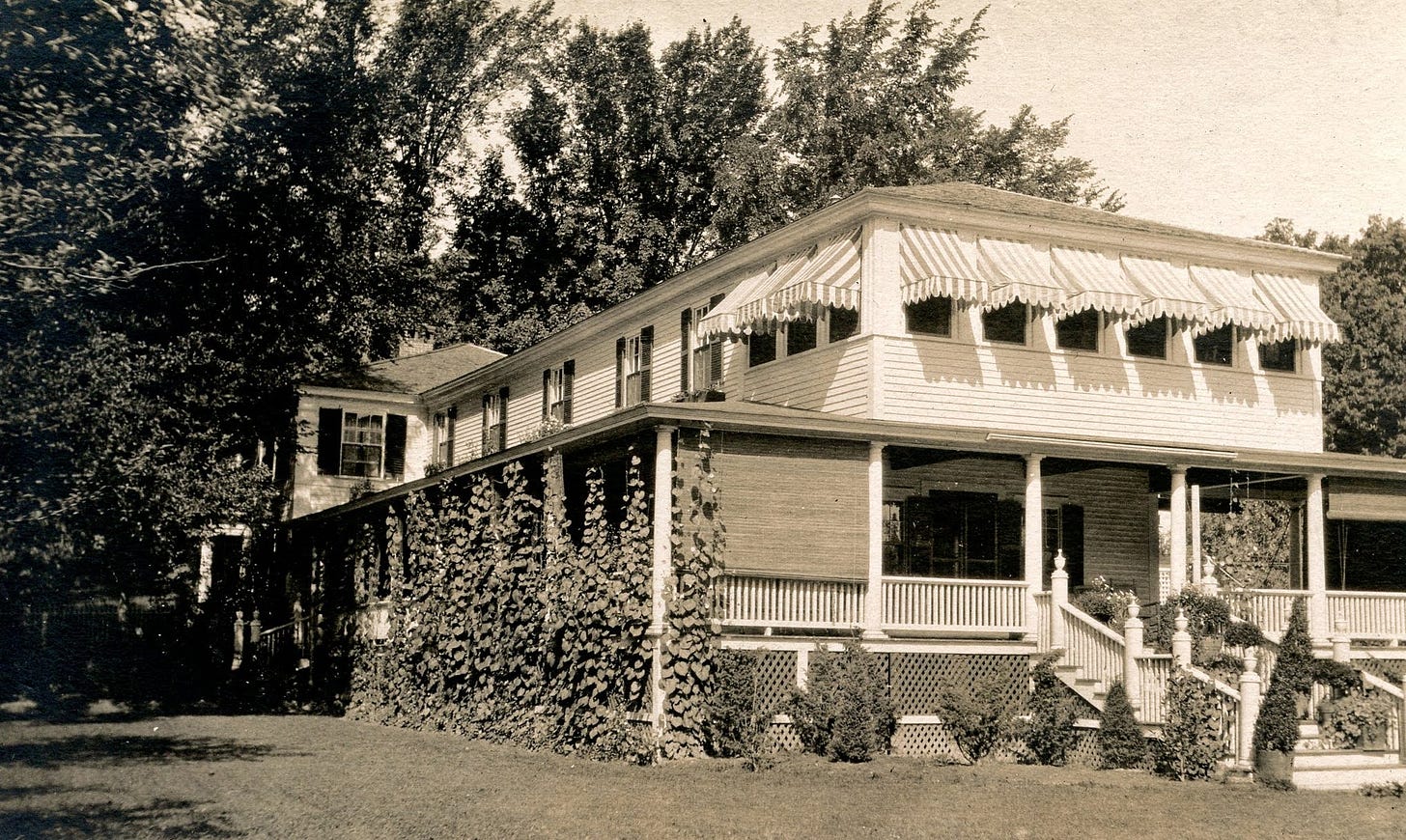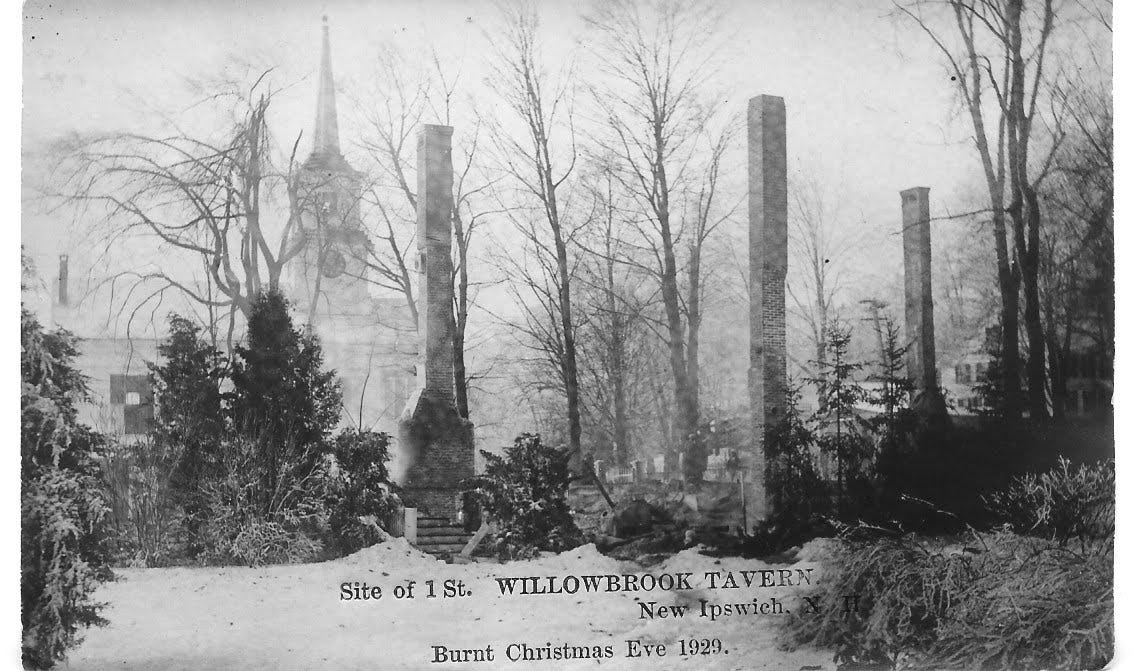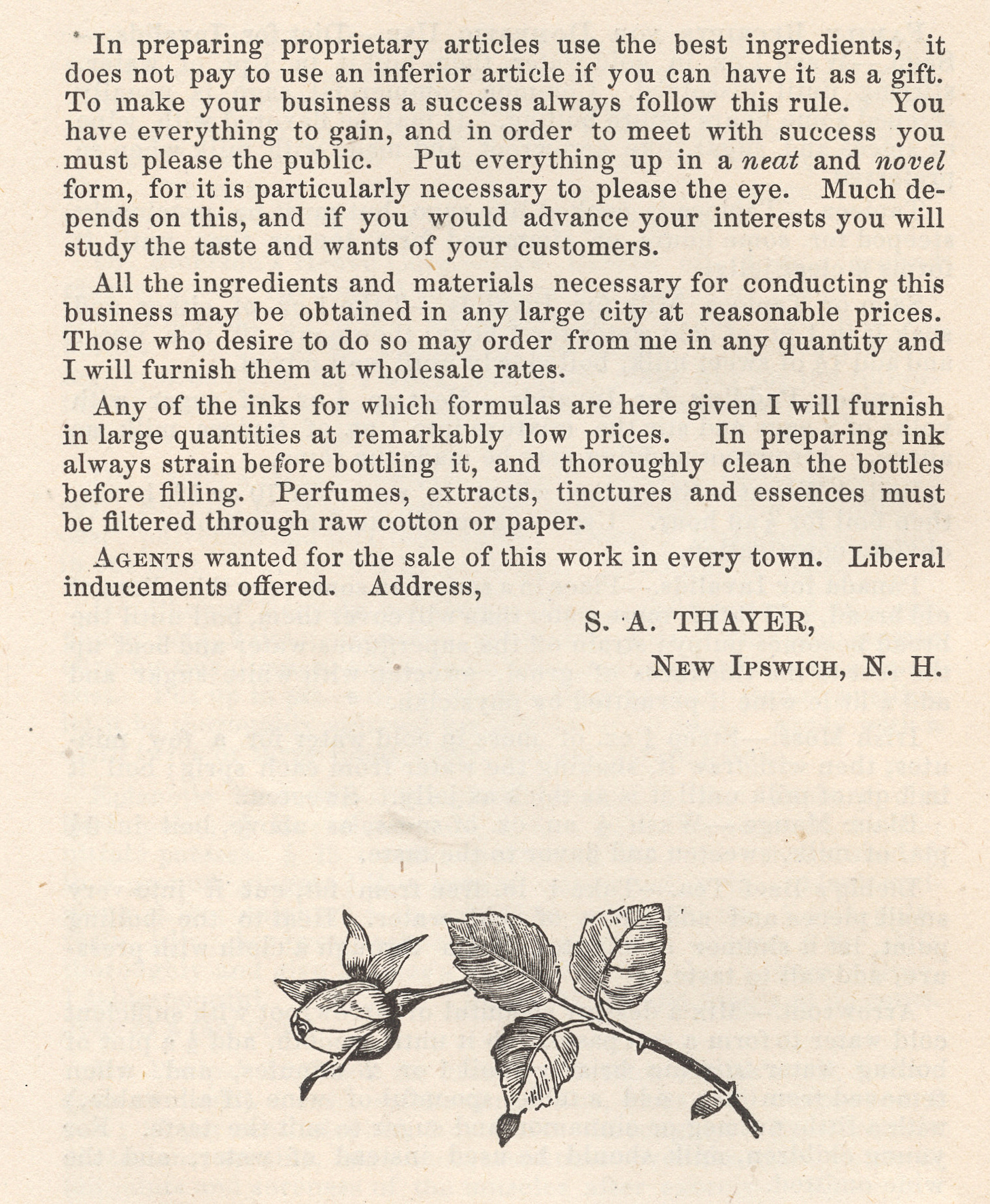April 22, 1900
News item about Homestead Inn which was located directly across the street from the current Historical Society (Intersection of Academy and Main Street). Conclusion of article.
Boston Charity is Situated in New Ipswich, NH
Pay if You Can, Free if You Have No Money
Delights of Life at the Haven of Rest
Sweet Peace Far From Madding Crowd’s Ignoble Strife.
Neither creed nor color, age nor occupation are reckoned as considerations for or against the offering of the "inn's" hospitality to any woman or girl. The "Homestead inn" is primarily devoted to the interests of single women and women without families, but the law is far from inexorable. In the case of a poor wornout mother who is un- able to leave her child or children behind while she seeks this much-needed and probably only opportunity for rest, the gracious sisters of St Margaret's who have charge of the "inn" in summer open their doors and its portals to the little ones as cordially as to their mother. To the tired and pale little shop girl arriving at the end of her railroad journey after a two hours' trip from hot and dusty Boston, Greenville, the branch terminus, looks a little disappointing, notwithstanding the tender light shed by the sinking western sun, and the faint sickle of the moon in the darker east. It strikes 7 o'clock as she alights on the rickety wooden platform and looks anxiously around, a little nervously and hesitatingly, for this is her first vacation in the country. Suddenly she hears a cheery voice through the evening air. "Passengers for New Ipswich! Fur the 'Homestead inn,' ain't you?" inquires a genial looking driver of an antiquated stage coach by the platform, as he hands the shrinking girl to a rather uncomfortable seat. With a loud crack of the driver's whip the vehicle begins to creak and move, and soon the wondering girl, already feeling a mental and moral sensation of ease and rest, if not a physical one, is being rumbled along over a sweet-smelling, hilly country road, to the combined restful tunes of the driver's cheerful whistle, the mellow croaking of the frogs in the meadows that line the road, and the even, deliberate trot of the sturdy horses. The last light from the sun has died completely out of the sky when the New Ipswich village lamps draw in sight. Overhead the stars are brighter still. The "barge" pulls up in front of the little low postoffice, and the girl looks curiously out at the little crowd of villagers collected at this regular evening gathering place of every New England town, while the driver throws off the mail bags. Then the barge moves on and turns a corner into a tree-lined street, finally making a halt before a long, rambling structure with wide verandas dotted here and there with the dark outlines of slowly swinging hammocks, of steamer chairs and settees. Moving figures can be dimly discerned by the light shining through the windows as the girl descends at her final destination. Sister Katherine, who has charge of St Monica's home in Boston during the winter and of the "Homestead inn" during the summer months, stands waiting at the gate with a candle in her hand, the hanging cross at her side, and the smiles of welcome on her face helping to form a picture which the young traveler can never forget. As she is ushered into the dining room where her supper is awaiting her, the strains of a merrily played piano sound from the girls' sitting room, where little groups of the "Inns' " inmates are gathered together at checkers, dominoes or engaged in crocheting, reading cr writing, while some more accomplished boarder is treating them to the melodies of song or dance music. In her little cot that night the toll and din and dust of her usual city life seem to have faded from her memory, and she falls gratefully asleep to the soulful serenade of frogs and crickets. The social life she wakes up to on the morning after arrival is various and diversified. There are walks and drives to be taken through the pine woods with new acquaintances, probably chosen from her own walk and station in life. For society at the "Homestead Inn," as elsewhere in the great world, adjusts itself according to the lines of community of thought and experience. Although kindness and courtesy are always maintained between the Inn's guests, sets are naturally formed, so that there is little or no friction between those belonging to slightly different ranks and walks in life. Teachers and typewriters, cooks and laundresses, dressmakers and slop-shop sewers. waitresses and cash girls, a sprinkling of pale-faced children and an occasional sick baby make up the heterogeneous family circle at the "Homestead Inn," and over these divers and sometimes otherwise uncongenial elements, Sister Katherine's gentle influence holds loving sway. There are no set rules of life at the "Inn." but the visitors are expected to be ready for their meals at the proper times, to be considerate of each other, and lastly to attend the chapel services. For although the hospitality of the Inn is extended to Jew and Gentile, Christian and unbeliever alike, the religious observances of the house must be respected. The little chapel at the end of the girls' sitting room is the pride of the sisters and of Mr. Prescott, and, indeed, a more charming little place of worship can hardly be imagined. In this chapel Sister Katherine and her assistants say their offices twice a day-morning and evening, and here, too, Mr. Prescott holds weekly service and gives communion to those who desire it. All the wild flowers of the season are constantly represented on the little altar, plucked fresh from the fields by the loving hands of the sisters. The girls' sitting room is a cheerful. pleasant rendezvous for the women and girls, and dominoes, checkers and music form a large part of the entertainment of the days and evenings. As often as is practicable coaching parties are arranged for the girls, and points of interest in the surrounding country are visited with picnic baskets. For New Ipswich, although a small and quiet village, is a place and is near other places of old colonial interest. Many names today famous in Boston were household words once in this little New England town. One of the favorite walks of the guests of "Homestead inn" is to the old graveyard. On the way they may see old placarded notices of town regulations, half-faded under wind and rain, and dead of their own uselessness and inertia. It should be a matter of pride to Boston that she has carried her beneficent charities even so far away as into the heart of a sister state; it might well seem as if the owners of Boston's great emporiums should extend some public approbation if not practical aid to an institution like this one of Mr. Prescott's, which yields such abundant returns to employers generally in the renewed physical vigor and in the moral and mental uplifting and recuperation of their employees. Would there were many such healthful and helpful institutions situated within easy reach of our hot and toilsome cities! Mr. Prescott and the St Margaret sisters have earned not only the affectionate gratitude of those who have been practically benefited by their unselfish and untiring efforts, but also the sincerest appreciation and encouragement of all who are interested in the public good.
Homestead Inn
Undated photo
Later after the Inn was purchased by Barr it was run as the Willowbrook Tavern. It burnt to the ground on Christmas Eve 1929. Note the location of the Baptist Church.
One Hundred Formulas -
George Carmichael donated a copy of Stephen A. Thayer’s “One Hundred Formulas” which was published in 1883. It contains recipes from everything from printing ink to pain killers. Today we will share the formula for restoring hair.
This book sold for a dollar and was one of the many enterprises that Steven A, Thayer was involved with (He had a cigar factory too). He had some advice for preparing the recipes.
James Roger diary entry
October 18th 1908 (Sunday)
Very warm day. Mr. Peacock preached from the text “The fear of the Lord is the beginning of wisdom”. S.S. after C.E. at 700 pm Mr. Peacock led and gave report of Mason S.S. convention topic Giving.





Such a contrast in Olde New Ipswich. Where, after being taken on an antique stagecoach ride, one could restore the nerves through a stay at Homestead Inn, soothed by croaking of frogs and chirping of crickets. But, after being taken for another type of ride, one could restore the hair by application of caustic quicklime and ammonia, burning the scalp and likely any hope of regrowth. .
It's too bad we longer have the Homestead Inn, every town should have one. It existed 30 years too early for my grandmother who left Nashua with her 10 yr old daughter and came to New Ipswich to be a maid and caretaker for an older man who had diabetes and no immediate family. I have a copy of her contract: $5/wk plus food and lodging for her and her daughter. My grandmother inherited his house and that's where I grew up.